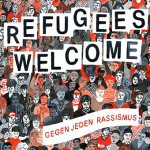Quelle: taz
Sampler „Refugees Welcome“
Die Macher des Samplers „Refugees Welcome“ wollen ein Gegengewicht zu Rassisten, AfD und Pegida schaffen. Die Erlöse gehen an Initiativen gegen rechts.
Wir sind viele. Das ist nicht nur der Titel eines Tocotronic-Songs. Das, so könnte man sagen, ist auch die einfache, schlichte und nötige Botschaft des heute erscheinenden Samplers „Refugees Welcome – Gegen jeden Rassismus“.
Quelle: YouTube
Veröffentlicht am 14.06.2014
directed by Alessandro Gassmann
lyrics by Erri De Luca
music by Daniele and Mauro Durante
Am 28. November 2013 um 19.30 Uhr gibt es im Stadtteilzentrum Kölibri (GWA-St.Pauli Süd) eine Präsentation von Gabriele del Grande nicht zu verpassen!
Lampedusa Rap und Harraga Special
Viele Rapper in Algerien, Tunesien und Marokko singen darüber, nach Europa zu migrieren. In ihren Texten ist der Seeweg nach Europa kein Verbrechen, sondern ein Abenteuer – ja fast eine Befreiung. Die Lieder erzählen von Menschen, die den Grenzübertritt ohne gültige Reisepapiere wagen, sogenannte „Harraga“. Sie beschreiben die Träume, die diese jungen Menschen von den Randgebieten der Welt ins Zentrum Europa treiben und die Enttäuschungen, die sie dort erfahren. Der italienische Journalist und Autor Gabriele del Grande stellt verschiedene Perspektiven in der Musik gegenüber und analysiert anhand dieser die Grenzen der Mobilität im Zeitalter der Globalisierung. Del Grande ist Gründer des Blogs „Fortress Europe“ (http://fortresseurope.blogspot.de/), auf welchem er die menschenunwürdige Praxis, der MigrantInnen an den Außengrenzen Europas ausgesetzt sind, dokumentiert und eine Übersetzung der bekanntesten Harraga-Songs vorstellt. Er erhielt 2010 den Pro-Asyl-Menschenrechtspreis.
auf dem Hein-Köllisch-Platz 11, 20359 Hamburg, nähe S-Bahn Reeperbahn oder Landungsbrücken
Slate Afrique | 18.11.2013
«Houmani», la chanson qui peut changer le visage de la Tunisie
Le clip des rappeurs tunisiens Hamzaoui Med Amine et Kafon connaît un grand succès. Plus qu’un rap, il est devenu un phénomène de société.
Houmani! Ce terme ne vous dit sûrement rien, mais en Tunisie rares sont ceux qui ne connaissent pas cette chanson. Mise en ligne le 14 septembre dernier, la chanson de Hamzaoui Med Amine et Kafon, deux rappeurs tunisiens, comptabilise aujourd’hui plus de 3,6 millions de vues, selon France 24. Un triomphe inattendu, compte tenu de la somme investie pour la réalisation du clip vidéo: 250 dinars, soit environ 110 euros.
Weiterlesen »
S. Dubois, Streets songs from the Syrian protests
http://www.perspectivia.net/content/publikationen/orient-institut-studies/2-2013/dubois_songs
Simon Dubois
Streets songs from the Syrian protests
Since March 2011, the Syrian uprising has created spaces for popular expression that were restricted during the preceding four decades of dictatorship. Numerous productions of texts, poems, caricatures, and songs began to appear on social media sites, and activists then gathered them onto networks providing local alternative information. These networks included websites, blogs, YouTube channels, Facebook and Twitter accounts.
S. Procházka: The Voice of Freedom
http://www.perspectivia.net/content/publikationen/orient-institut-studies/2-2013/prochazka_freedom
Orient-Institut Studies 2 (2013)
Stephan Procházka
The Voice of Freedom: Remarks on the Language of Songs from the Egyptian Revolution 2011
Introduction
As in many revolutions, music and songs played a crucial role in the events that took place on Tahrir Square during the so-called 25 January Revolution. Alongside slogans that were shouted or presented on banners, cartons, buttons and the like, songs constituted an integral part of what happened on the Square during the 18 days of the uprising.
I. Dallaji: Tunisian Rap Music and the Arab Spring
http://www.perspectivia.net/content/publikationen/orient-institut-studies/2-2013/dallaji_rap
Ines Dallaji
Tunisian Rap Music and the Arab Spring:
Revolutionary Anthems and Post-Revolutionary Tendencies
After the emergence of the so-called Arab spring in 2011, Tunisian rap music became a subject of great interest to the public and the media. This was due above all to El Général, a young rap artist from the Tunisian city of Sfax, and the success of his song Ṛayīs li-Blād (Head of State).1
Y. Gonzalez-Quijano, Rap, an Art of the Revolution or a Revolution in Art?
Yves Gonzalez-Quijano
Rap, an Art of the Revolution or a Revolution in Art?
Ever since it has become common to speak of the „Arab Spring“, it is easy to see the extent to which certain cultural practices that are particular to youth have turned into an „obligatory figure of speech“ in media reports and even among social scientists, as testified in Inverted Worlds: Congress on Cultural Motion in the Arab Region.
Weiterlesen »
Tamikrest : « Notre peuple veut être maître de son destin »
Julien Le Gros, Africultures
http://www.tamoudre.org/touaregs/musique/tamikrest-notre-peuple-veut-etre-maitre-de-son-destin.html
Les Tamikrest sont sans conteste les fils adoptifs du groupe touareg Tinariwen. Leur troisième album, dédié aux femmes victimes de guerre s’appelle Chatma.En kel tamashek, la langue touarègue, Tamikrest veut dire le nœud, l’union. Cette union est celle de sept jeunes de villages différents, de la région de Kidal, au nord-est du Mali, rassemblés autour de la passion de la musique. Influencés par leur tradition bien sûr, leurs héros s’appellent aussi Mark Knopfler, et Bob Marley.
Weiterlesen »

